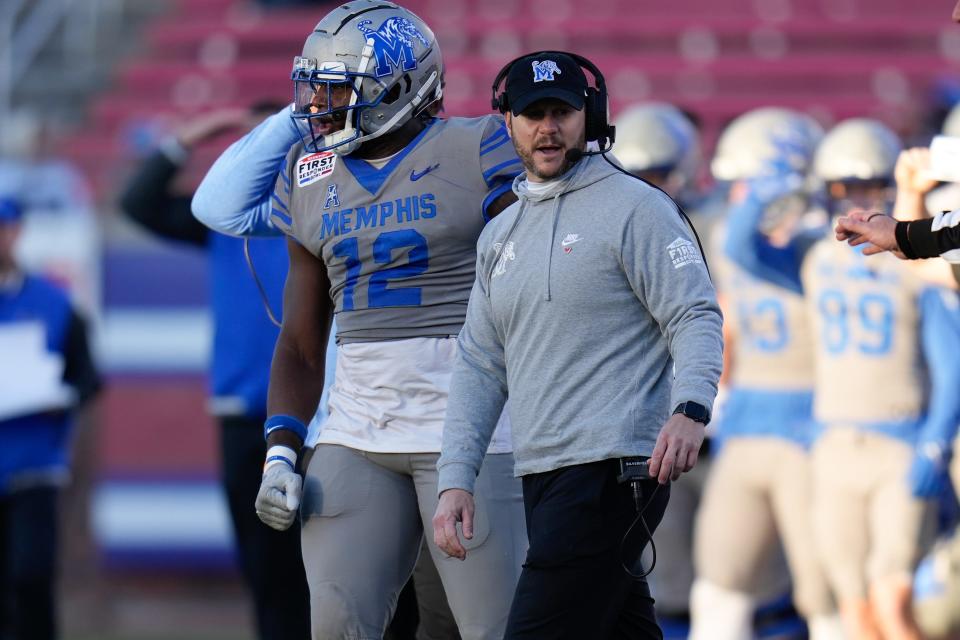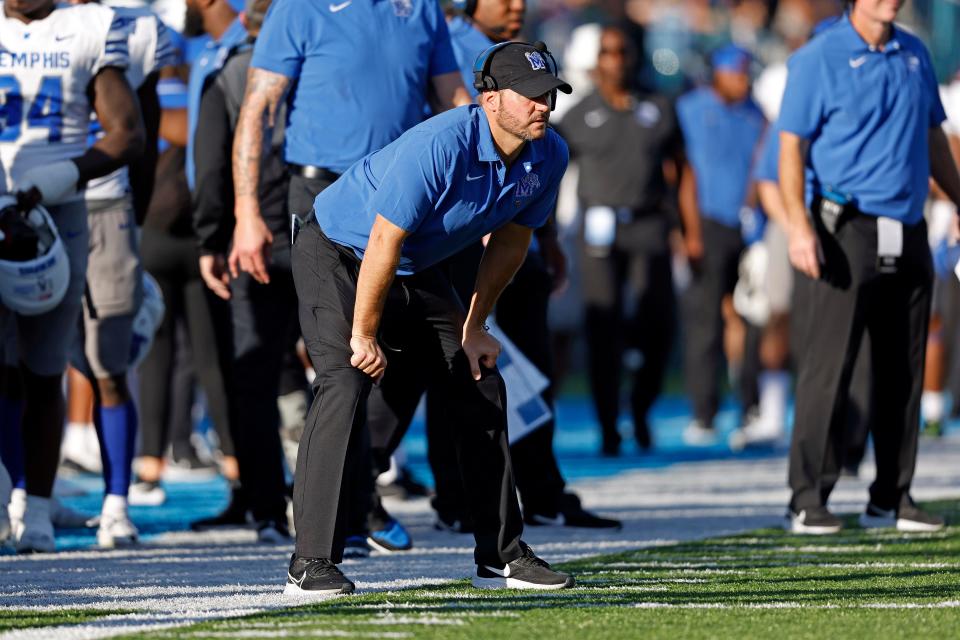Ryan Silverfield's unusual coaching journey will be defined by 2023 Memphis football season
University of Memphis athletic director Laird Veatch called Ryan Silverfield at 12:30 a.m. and gave him a choice.
This was December 2019, right after former Memphis football coach Mike Norvell left for Florida State.
As Norvell prepared for his first press conference in Tallahassee, Silverfield said, Norvell had already told Silverfield he wanted to hire him as an offensive line coach and introduce him to Florida State fans. But Veatch was potentially offering more. Memphis wanted Silverfield to be the interim head coach at the Cotton Bowl, and it wanted to interview him for the full-time gig.
"You can turn down the interim so you can prepare for the interview,'" Silverfield recalled Veatch telling him.
That was never an option.
"No, I'll take the interim head coach job," Silverfield responded, "because we've got a lot of work to do here."
He got the job permanently a few days later. When Silverfield stepped onto the field against Penn State in the Cotton Bowl, it was the first time he'd been a head coach in 15 years. The ensuing three seasons have been something of a rollercoaster, from a COVID-19 season in 2020 that included canceled games at both ends of the campaign to consecutive 6-6 regular seasons. Expectations are high coming into 2023, with Memphis now positioned as a heavyweight in the new-look AAC.
This season will potentially define his career — an unorthodox journey spanning more than half his life, from Hampden-Sydney College to the NFL to Memphis and plenty of places in between.

'We didn't understand who we had'
Th 43-year-old's coaching origin story starts earlier than almost any coach you’ll meet – high school. A Jacksonville, Florida native, Silverfield played on the defensive line at Bolles School under legendary high school coach Corky Rogers. Surrounded by Division-I talent, Silverfield was part of a dynastic program but wasn’t a blue-chip prospect like many of his teammates. He took a visit to FCS-level Georgetown and had some other interest, but suffered a neck injury and doctors recommended he stop playing football.
So, as a high school senior, Silverfield became a coach.
He went to college at Division-III Hampden-Sydney College in Virginia, waiting outside the door of new coach Marty Favret’s office as a sophomore and begging him for a spot on the coaching staff.
He stayed on for a year after he graduated with an economics degree he says he knew he’d never use, then ended up on a recruiting trip to Memorial Day High School in Savannah, Georgia.
That led to a stroke of good luck because Memorial Day was looking for a football coach, and Mark Sussman – the school’s athletic director – was convinced Silverfield was the 23-year-old man for the job. He gave Silverfield his first head coaching job – his only one before Memphis.
The team was horrible. They had 19 players in total, practicing on a 50-yard-field that wasn’t equipped for an actual football practice. They went 1-9, with every loss coming by double digits. There was a saving grace, though. They beat St. Andrews, their main rivals. So Silverfield’s tenure can at least be remembered for that triumph.
“I'm not trying to speak for everybody, but it was like, I guess we didn't understand who we had,” said Tyler Helmly, who played center on the team and later became the coach and athletic director at Memorial Day. “And we didn't want to listen all the time. We were hard-headed.”
Everyone knew Silverfield was going to move on after the season, but he’s still in touch with Sussman nearly 20 years later. The two text after every Tigers game.
“I feel like it's my son and I'm watching him,” Sussman said. “I’m like ‘Holy Mackerel! I gave this kid his break!’”
More: Memphis football releases initial depth chart ahead of opener against Bethune-Cookman
How NFL shaped Silverfield
Silverfield bounced between a few jobs before a seemingly random connection helped him make the jump to the NFL. He worked under offensive coordinator Tim Salem as a graduate assistant at UCF, and Salem's brother, Brad, had played college football under offensive coordinator Brad Childress at Northern Arizona. That helped Silverfield get his foot in the door with Childress, who at that point was the head coach of the Minnesota Vikings.
“Ryan wasn't short on spending time,” Childress said. “He spent time at his trade and got pretty doggone good at it.”
Silverfield started as a quality control coach before switching to the defensive and then offensive line a few years later, staying on as part of Leslie Frazier’s staff when Childress was fired in 2010. Silverfield and Frazier had hit it off when Frazier was the defensive coordinator, two opposites who would work out at the facility together and go to Twins games on their days off.

They remained close even after Frazier and the rest of the staff were let go after the 2013 season. Frazier stopped by Memphis practices earlier this summer for a few days, speaking to the players and consulting with Silverfield on the program’s progress.
“I think that's one of the reasons players want to play for him, it comes across that he genuinely cares about people,” Frazier said. “And that's what struck me. We got a chance to get to know each other early on and the fact that we had different backgrounds, we were different races, none of that came into play. It was just two people with like minds just hanging out together and just enjoying each other's company. And that's the way life should be.”
Silverfield took a kind of tour of various college programs across the country after being let go in Minnesota. He spent a year as an offensive consultant at Toledo, then joined Arizona State at the urging of Norvell, whom he’d met during a visit to Tempe. They clicked right away and stayed in touch even when Silverfield left mid-season to become the assistant offensive line coach for the Detroit Lions.
So it was Norvell who called Silverfield in the early hours of Dec. 4, 2015. They were in different headspaces.
Norvell had just been named head coach at Memphis. Silverfield was despondent, just hours removed from the Miracle in Motown, when Aaron Rodgers launched a pass 61 yards through the Detroit night with zero seconds left on the clock to win the Packers the game and end the Lions' push for a playoff berth.
But Silverfield’s night was about to get better.
Norvell, who declined an interview request for this story, was going to be introduced by Memphis the next day, and he wanted Silverfield to come with him.
Silverfield joined the program about a month later and has been here ever since.
Reach sports writer Jonah Dylan at jonah.dylan@commercialappeal.com or on Twitter @thejonahdylan.
This article originally appeared on Memphis Commercial Appeal: Why 2023 Memphis football can define Ryan Silverfield coaching journey

